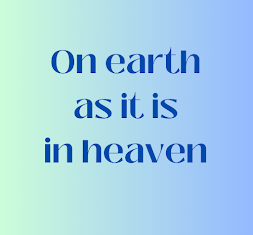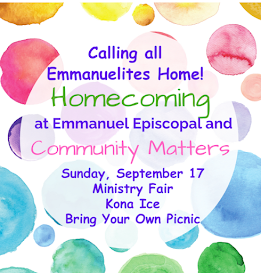Lectionary (Proper 19): Exodus 14:19-31; Psalm 114; Romans 14:1-12; Matthew 18:21-35
En el nombre del Dios: creador, redentor, y santificador. Amen.
Our Scripture today is all about relationship: God’s relationship with us (the way of heaven) and our relationships with one another (the way of earth). As Christians, it is our mission to make the way of heaven and the way of earth the same reality, the only reality – “on earth as it is in heaven.”
Our Scripture stories teach us that the way of heaven is characterized by mercy and forgiveness while the way of earth is too often unmerciful and unforgiving. While the words of our stories today may be jarring and difficult to hear, the overriding message is such good news! The ultimate plan of God is for the redemption of the whole world, the reclamation of all back into the love from which we were created.
Forgiveness is complicated. We often have to offer it in the absence of satisfaction. It’s only natural to want to be satisfied that someone knows we’ve been wronged and makes it right again, but often, what we seek as justice is really retribution or revenge.
In addition, the one who sinned against us may never acknowledge their sin or accept our forgiveness. That doesn’t matter because when we offer forgiveness, it isn’t to fix a problem or heal a wound. It’s to let it go, to release it, to loose it, and trust God to do the rest.
Ultimately, forgiveness is a gift of freedom. It frees our thoughts from the tyrannical presence of the sinner and the sin. It frees our bodies from the stresses of the hurt and pain. And it frees our souls from the bleeding of the ruptured relationship.
I share a poem from Mpho Tutu, Desmond Tutu’s daughter. It’s called “I will forgive”
“I will forgive you.The words are so small, but there’s a universe hidden in them.When I forgive you, all those cords of resentment, pain, and sadnessthat had wrapped themselves around my heartwill be gone.When I forgive you, you will no longer define me.You measured me, and assessed me,and decided that you could hurt me,that I didn’t count.But I will forgive you because I do count.I do matter.I am bigger than the image you have of me.I am stronger. I am more beautiful.I am infinitely more precious than you thought me.I will forgive you.My forgiveness is not a gift that I am giving to you.When I forgive you,my forgiveness will be a gift that gives itself to me.”
When I was a teenager, I was on a swim team with my younger sister. We used to practice in roped-off lanes between the docks on our lake. During one swim practice, my sister got a cramp and began to go under. When I jumped in to help her, she, like many other people who fear they are drowning, began to fight me.
I was trained as a lifeguard and she was an experienced swimmer, but the problem wasn’t about swimming. I knew my sister could die if I didn’t connect with her just then; and surprising even myself, I called out to her: “Sissy, do you trust me?”
The question caught her attention, and she stopped flailing - just for a moment. I used that pause in her panic to grab her into the save hold. Once in the save hold, her head was near mine, so I could speak assurances to her as we headed for shore.
Sometimes God’s save hold feels like that.
In our story from Exodus God tells Moses to stretch out his hand. God is asking Moses, do you trust me? Will you go where I lead you, even if it’s into the sea where you might drown? I have promised to lead my people to the Promised Land, God says. Do you trust me? Take my people with you. Some are going to fight you. They’re just afraid. Hold onto them anyway.
The part of this story that jars us is the end of it. What about those Egyptians who lay dead on the shore? How can God destroy people like that? Aren’t they also children of God?
The answer is yes! There is a traditional Jewish midrash (commentary) that says, “on seeing the drowning Egyptians the angels were about to break into song when God silenced them declaring, “How dare you sing for joy when” my children lay dead on the ground? (Talmud, Megillah 10b and Sanhedrin 39b).
God’s plan is for the reconciliation of the whole world. Therefore, it always includes reclaiming the least, the lost, the hated, and the hateful. Reconciliation re-establishes relationship with them which restores the family of God to wholeness.
By our Baptism, we have been made co-creators with God. As we heard last week, what we hold bound on earth, is held bound in heaven and what we loose on earth is loosed in heaven. This is how we co-create the reality in which we live. We choose it.
The sin, the hurt, the wound we cling to remain in us. The rupture in relationship caused by the sin takes up space in our thoughts and eventually affects our bodies. Anger, resentment, and tension become stomach aches, headaches, high blood pressure, and lots of other somatic symptoms. Is this the reality we want?
Our other choice is to forgive. When we forgive, we set the sin and the sinner loose. We release it from ourselves, our bodies and souls, and trust God to bring about justice and reconciliation – remembering that God’s plan includes the reclamation of all – even the one who sinned.
It may take a moment, or it may take years. Sometimes justice and reconciliation may not be something we get to see happen in our lifetime, but it will happen. That’s the promise.
Most of us talk about sin as those things we do that are wrong or harmful. That’s partly right. Theologian Karl Barth talks about sin as a state of separation from God and one another. It is when we are in that state of separation that we do those things that are wrong and harmful.
It’s kind of like the disease versus the symptoms. We know there is a disease by the presence of the symptoms. We can treat the symptoms, but unless we cure the disease, we are not healed. That’s why Jesus brought us redemption by the forgiveness of sin, bringing down all barriers that separate us from God and from one another.
In his most miserable, painful, humiliating moment as a human, as he was dying on the cross, Jesus’ prayer takes our breath away: “Father, forgive them…” At our most miserable moments, when we have been unfairly treated or wronged, is this our prayer?
Years ago I visited a place in England called the Cathedral at Coventry. The city of Coventry was bombed into near oblivion during WWII and the cathedral was destroyed. When you go to the cathedral now, you will see that they didn’t clear away the rubble from the bombing. They simply built the new cathedral adjacent and attached it to the bombed-out shell with a walkway.
The very first thing you see as you walk into the narthex of the new cathedral, written in the tile on the floor, are the words: “Father forgive” and every day they offer Noonday Prayer in the bombed-out shell. They do not forget, but they continually forgive.
We all must continually forgive every time the hurt or anger rises up in us again. It’s a process.
Since we all sin, we all need to be forgiven, and we all need to be forgiving. Jesus makes this very plain in the story of the wicked slave in the gospel. The slave-owner (God) forgives the slave who begs for mercy on the debt he can’t repay. Then that same slave goes out and cruelly and violently punishes those who owe him. When the slave owner learns about this, he becomes enraged: You wicked slave! he says. Shouldn’t you have forgiven them as I forgave you? By not forgiving, you have held that sin bound and condemned yourself to an eternity of torture by your choice.
When we refuse to forgive, we are the ones who suffer. Whether we refuse to forgive another, or ourselves, or even when we refuse to forgive God, we suffer because our relationship has been disrupted. We, who are one, become fractured. If you’ve ever broken a bone, you know how painful a fracture is. The same is true of a fractured relationship.
To forgive is to trust that God will bring about divine justice, reconciliation, and wholeness from every experience of brokenness on earth. When we try to do this ourselves, it’s like trying to save ourselves from drowning. We can’t.
Each of us will need to be forgiven at some point in our lives, and each of us will need to forgive someone else. Forgiveness is a spiritual muscle we must develop and practice and church is where we do that. Offering our prayers and praise to God and sharing in God’s holy food of Communion strengthens and unites us. We need to eat together, pray together, and play together. We even need to disagree together.
Each one of us is created by God, treasured of God, gifted and sent by God to co-create the way heaven on earth. Our church equips and supports us to accomplish this. After our worship today we will enjoy time together at our Homecoming Picnic with Community Matters & Ministry Fair, connecting the dots, that is, listening for how God is gifting us in this moment of our Christian journey, then finding the ministries of the church that enable us to use those gifts as we work together to make the way of heaven and the way of earth the same reality, the only reality.
Amen.




No comments:
Post a Comment